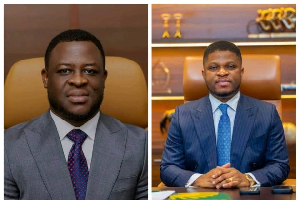In five months Ghana will be fifty. What is the prognosis for Ghana at hundred? Good or bleak? Are we going to allow the same iniquities that have plagued Ghana for fifty years continue to derail the vision of the country? There are so many lessons learned since independence (or should I say proclaimed independence?)
- Is it justified that at 50 we are still rationing a basic utility like electricity?
- Is it justified that at 50 all our doctors are leaving the country?
- Are we proud that at 50 the only high speed road in Ghana is the Accra-Tema motorway?
At fifty, one of the key questions Ghanaians should ask is: Are we domestically strong or we still depend heavily on foreign minds to move forward? Are services being rendered by foreign nationals doing Ghana more harm than good? One school believes that the answer to this question is an absolute YES. The inability of Ghana and many other African countries to advance the course of economic emancipation for their people is partly due to the fact that most of our key resources and important agencies are in the hands of foreign managements that are seeking the interest of their governments or parent companies abroad and not the host country. For example, I want our leaders in Ghana to put a value on Obuase’s contribution to Ghana since independence. After this, they should take a trip to Obuase and look at what the mining companies have done to that poor town and her inhabitants. Such things in my opinion should be classified as crime against humanity and perhaps be tried at the international court of justice. Oh, by the way, while in Obuasi, bring some drinking water from there and get the Ghana food Board do a chemical test on it-a cyanide test will be great. If the same management that managed AGC for all those years were managing “an Obuase” in a place like England or South Africa, do you think the city will look like what you see in Obuasi today? Obuase has had a very interesting past. I remember growing up in Obuase around the 70s where they had the European club and the African club. As the name implies, the European club was for white people where beer, wine, food, fanta etc. were literally free. Things were free for people who got paid more than 100 times their counterparts in Ghana.
As a nation, we still see the white man as the only possible solution to our problems. Surprisingly, most of these so call expatriate have less education, less knowledge and less experience than the people they supervise.
Even though I strongly disagree with most of the things former president J. J Rawlings and his administration did over the course of their twenty year tenure, I agree with him on at least this quote he made during the days of the revolution and I quote: “I will rather die than to be a slave in my own country”. May be until you spend a considerable amount of your life outside the shores of Ghana and in the white man’s world, you may not understand the full impact of that statement. In today’s world, while the white man has literally stopped physical enslavement, we are begging them to enslave us mentally by giving them all the tools they need on a silver platter. Our continuing dependency on foreign labor in some of our strategic positions is destroying the country.
Ghana needs to tap into the pool of well-qualified Ghanaians both at home and abroad. We need to recruit these people, pay them well and weed out the corruption. I will also propose that instead of bringing a Norwegian expatriate to run an agency like Ghana Telecom, bring a Naturalized Ghanaian in Norway, Great Britain, USA, Canada, etc with similar skills to come and run such agencies. There is nothing wrong with paying a well-qualified black man what you pay a well-qualified white man. Jealousy and corruption are some of the factors that are preventing us from bringing the best amongst us and pay them to get the right job done right.
Three years ago, the honorable minister for Trade and Industry (who was then the Ghana ambassador to the United States) Mr. Alan Kyerematen and I took a delegation of twenty business people from the United States to Ghana. In one of our meetings, I suggested putting together a group of professionals in the Road and Transport industry to provide a free technical support in current technologies and initiatives that can support Ghana’s economies. I was shocked to hear from one of the directors that “they have the technical men on the ground”.
To put it in the right perspective, the Ambassador was unhappy with that statement but the then minister said nothing. These same technical men sign off on highway projects that have dangerous design flaws. Such flaws include dangerous curves and poor geotechnical work causing dangerous sinkholes and potholes contributing to making our roads Dieways instead of Highways. The Directors of these government agencies are most of the time the problem in these corruption infested economies. Because of corruption, our leaders do not want good service even when they are free. What an irony! What is wrong with having an annual conference of professional Ghanaians abroad converging in Ghana to present information in their fields. A presentation on current good practices in such fields as banking, housing, transportation, agriculture, healthcare, will surely be useful to the country. As a matter of fact, if our government is functioning well, this should be part of a strategic plan to gain from the brain drain we talk negatively about all the time. Such a program should be in the plan of the Ministry of information with the support from other ministries and the President’s office. China is producing almost everything today. Do you think they developed the technologies themselves?
Ghana is spending too much money on many people but their own. Ghana, like every nation needs the support from other nations. But we should be ready to ask critical question to make sure that our borrowed resourced are spent wisely to the pesewa. The following are some key questions to ask:
- 1) Does the level of compensation given to expatriates match the efforts they put in the economy of Ghana?
2) Are they really serious in helping Ghana advance?
3) Are they a hindrance or supporter of our agenda?
4) What are their backgrounds?
5) Would it not be better to have a foreign-trained Ghanaian replace this person if we can find one?
Today, like fifty years ago, the vision of the country lies only in the eyes of honest Ghanaians. Bringing expatiates with huge compensation packages to run key agencies in the country is doing Ghana more harm than good. I challenge Ghanaians to look at the compensation packages of these expatriate. Do we get similar packages when we come to their countries? What is happening is, they have physically given us the keys to our country’s gates (call it Independence) and have kept the keys to the main doors in the country (call it neo-colonialism).
After fifty yeas, our Gold, Diamonds, and even our telecommunication service are all run buy foreign agencies. What does a Norwegian consulting company bring to the table to run Ghana Telecom? There are so many Norwegians and other nationals supposedly consulting at various management capacities and being paid huge sums of money. $7000 (¢63,000,000) a month is not a strange basic salary for these expatriates. I challenge the government of Ghana to do an audit and put together a group of professionals to provide a comprehensive evaluation of these so-called consultants.
Key Agencies in Ghana need people with vision tied to the nation’s vision. Such a vision can only come from an honest and well-qualified Ghanaian and not a foreigner. What is Ghana showing after 50 years and what do we plan to show in the next fifty years?















